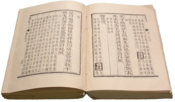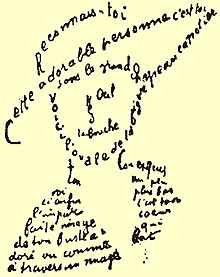Literature
| Literature |
|---|
 |
| Major forms |
| Genres |
| Media |
| Techniques |
| History and lists |
| Discussion |
Literature is a group of works of art made up of words. Most are written, but some are passed on by word of mouth. Literature usually means works of poetry and prose that are especially well written.[1] There are many different kinds of literature, such as poetry, plays, or novels. They can also be put into groups through their language, historical period, origin, genre, and subject.[1] The word literature comes from the Latin word "learning, writing, grammar"
Most of the earliest works were epic poems. Epic poems are long stories or myths about adventures. Ramayana and Mahabharta, two Indian epics, are still read today. Odyssey and Iliad are two famous Greek poems by Homer. They were passed down through speaking and written down around the 8th century BC.
Literature, most generically, is any body of written works. More restrictively, literature is writing considered to be an art form, or any single writing deemed to have artistic or intellectual value, often due to deploying language in ways that differ from ordinary usage.
Its Latin root literatura/litteratura (derived itself from littera: letter or handwriting) was used to refer to all written accounts, though contemporary definitions extend the term to include texts that are spoken or sung (oral literature). The concept has changed meaning over time: nowadays it can broaden to have non-written verbal art forms, and thus it is difficult to agree on its origin, which can be paired with that of language or writing itself. Developments in print technology have allowed an evergrowing distribution and proliferation of written works, culminating in electronic literature.
Literature can be classified according to whether it is fiction or non-fiction, and whether it is poetry or prose. It can be further distinguished according to major forms such as the novel, short story or drama; and works are often categorized according to historical periods or their adherence to certain aesthetic features or expectations (genre).
Definitions
There have been various attempts to define "literature".[1] Simon and Delyse Ryan begin their attempt to answer the question "What is Literature?" with the observation:
Definitions of literature have varied over time: it is a "culturally relative definition".[3] In Western Europe prior to the 18th century, literature denoted all books and writing.[3] A more restricted sense of the term emerged during the Romantic period, in which it began to demarcate "imaginative" writing.[4][5] Contemporary debates over what constitutes literature can be seen as returning to older, more inclusive notions; Cultural studies, for instance, takes as its subject of analysis both popular and minority genres, in addition to canonical works.
The value judgment definition of literature considers it to cover exclusively those writings that possess high quality or distinction, forming part of the so-called belles-lettres ('fine writing') tradition.[6] This sort of definition is that used in the Encyclopædia Britannica Eleventh Edition (1910–11) when it classifies literature as "the best expression of the best thought reduced to writing."[7] Problematic in this view is that there is no objective definition of what constitutes "literature": anything can be literature, and anything which is universally regarded as literature has the potential to be excluded, since value judgments can change over time.[6]
The formalist definition is that "literature" foregrounds poetic effects; it is the "literariness" or "poetic" of literature that distinguishes it from ordinary speech or other kinds of writing (e.g., journalism).[8][9] Jim Meyer considers this a useful characteristic in explaining the use of the term to mean published material in a particular field (e.g., "scientific literature"), as such writing must use language according to particular standards.[1] The problem with the formalist definition is that in order to say that literature deviates from ordinary uses of language, those uses must first be identified; this is difficult because "ordinary language" is an unstable category, differing according to social categories and across history.[10]
Etymologically, the term derives from Latin literatura/litteratura "learning, a writing, grammar," originally "writing formed with letters," from litera/littera "letter".[11] In spite of this, the term has also been applied to spoken or sung texts.[1][12]
Poetry
Poetry is a form of literary art which uses aesthetic and rhythmic qualities of language to evoke meanings in addition to, or in place of, prosaic ostensible meaning.[13] Poetry has traditionally been distinguished from prose by its being set in verse;[a] prose is cast in sentences, poetry in lines; the syntax of prose is dictated by meaning, whereas that of poetry is held across meter or the visual aspects of the poem.[18]Prior to the 19th century, poetry was commonly understood to be something set in metrical lines; accordingly, in 1658 a definition of poetry is "any kind of subject consisting of Rhythm or Verses".[13] Possibly as a result of Aristotle's influence (his Poetics), "poetry" before the 19th century was usually less a technical designation for verse than a normative category of fictive or rhetorical art.[19] As a form it may pre-date literacy, with the earliest works being composed within and sustained by an oral tradition;[20][21] hence it constitutes the earliest example of literature.
Prose
Prose is a form of language that possesses ordinary syntax and natural speech rather than rhythmic structure; in which regard, along with its measurement in sentences rather than lines, it differs from poetry.[18][22] On the historical development of prose, Richard Graff notes that "[In the case of Ancient Greece] recent scholarship has emphasized the fact that formal prose was a comparatively late development, an "invention" properly associated with the classical period".[23]
- Novel: a long fictional prose narrative. It was the form's close relation to real life that differentiated it from the chivalric romance;[24][25] in most European languages the equivalent term is roman, indicating the proximity of the forms.[25] In English, the term emerged from the Romance languages in the late 15th century, with the meaning of "news"; it came to indicate something new, without a distinction between fact or fiction.[26] Although there are many historical prototypes, so-called "novels before the novel",[27] the modern novel form emerges late in cultural history—roughly during the eighteenth century.[28] Initially subject to much criticism, the novel has acquired a dominant position amongst literary forms, both popularly and critically.[25][29][30]
- Novella: in purely quantitative terms, the novella exists between the novel and short story; the publisher Melville House classifies it as "too short to be a novel, too long to be a short story".[31] There is no precise definition in terms of word or page count.[32] Literary prizes and publishing houses often have their own arbitrary limits,[33] which vary according to their particular intentions. Summarizing the variable definitions of the novella, William Giraldi concludes "[it is a form] whose identity seems destined to be disputed into perpetuity".[34] It has been suggested that the size restriction of the form produces various stylistic results, both some that are shared with the novel or short story, and others unique to the form.
- Short story: a dilemma in defining the "short story" as a literary form is how to, or whether one should, distinguish it from any short narrative; hence it also has a contested origin,[38] variably suggested as the earliest short narratives (e.g. the Bible), early short story writers (e.g. Edgar Allan Poe), or the clearly modern short story writers (e.g. Anton Chekhov).[39] Apart from its distinct size, various theorists have suggested that the short story has a characteristic subject matter or structure; these discussions often position the form in some relation to the novel.
Drama
Drama is literature intended for performance. The form is often combined with music and dance, as in opera and musical theater. A play is a subset of this form, referring to the written dramatic work of a playwright that is intended for performance in a theater; it comprises chiefly dialogue between characters, and usually aims at dramatic or theatrical performance rather than at reading. A closet drama, by contrast, refers to a play written to be read rather than to be performed; hence, it is intended that the meaning of such a work can be realized fully on the page.[44] Nearly all drama took verse form until comparatively recently.
Greek drama exemplifies the earliest form of drama of which we have substantial knowledge. Tragedy, as a dramatic genre, developed as a performance associated with religiousand civic festivals, typically enacting or developing upon well-known historical or mythological themes. Tragedies generally presented very serious themes. With the advent of newer technologies, scripts written for non-stage media have been added to this form. War of the Worlds (radio) in 1938 saw the advent of literature written for radio broadcast, and many works of Drama have been adapted for film or television. Conversely, television, film, and radio literature have been adapted to printed or electronic media.
Literature, a body of written works. The name has traditionally been applied to those imaginative works of poetry and prose distinguished by the intentions of their authors and the perceived aesthetic excellence of their execution. Literature may be classified according to a variety of systems, including language, national origin, historical period, genre, and subject matter.
For historical treatment of various literatures within geographical regions, see such articles as African literature; African theatre; Oceanic literature; Western literature; Central Asian arts; South Asian arts; and Southeast Asian arts. Some literatures are treated separately by language, by nation, or by special subject (e.g., Arabic literature, Celtic literature, Latin literature, French literature, Japanese literature, and biblical literature).
Definitions of the word literature tend to be circular. The 11th edition of Merriam-Webster’s Collegiate Dictionary considers literature to be “writings having excellence of form or expression and expressing ideas of permanent or universal interest.” The 19th-century critic Walter Paterreferred to “the matter of imaginative or artistic literature” as a “transcript, not of mere fact, but of fact in its infinitely varied forms.” But such definitions assume that the reader already knows what literature is. And indeed its central meaning, at least, is clear enough. Deriving from the Latin littera, “a letter of the alphabet,” literature is first and foremost humankind’s entire body of writing; after that it is the body of writing belonging to a given language or people; then it is individual pieces of writing.
But already it is necessary to qualify these statements. To use the word writing when describing literature is itself misleading, for one may speak of “oral literature” or “the literature of preliterate peoples.” The art of literature is not reducible to the words on the page; they are there solely because of the craft of writing. As an art, literature might be described as the organization of words to give pleasure. Yet through words literature elevates and transforms experience beyond “mere” pleasure. Literature also functions more broadly in society as a means of both criticizing and affirming cultural values.
Reference:
https://en.wikipedia.org/wiki/Literature
https://simple.wikipedia.org/wiki/Literature
www.britannica.com/art/literature

Best ways to get from casino to keno - Jtmhub
ReplyDeleteThe nearest 충주 출장마사지 casino to your 전라남도 출장안마 location, which is within a 10-minute drive of The Cromwell Casino at The 안동 출장안마 Cromwell Road, is The 충청남도 출장마사지 Cromwell Casino. 밀양 출장안마
I wanted to thank you for this great read. Your blog is one of the finest blog . Thanks for posting this informative article
ReplyDeleteScope of Swahili language Course in Delhi, India
Scope of Hindi Langauge Course in Delhi